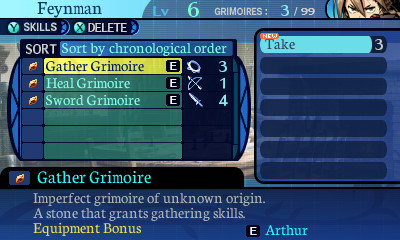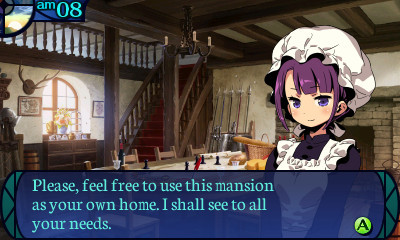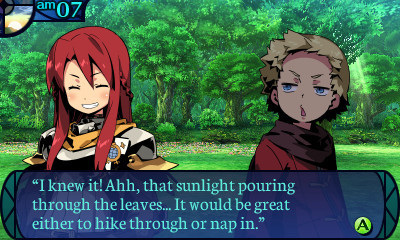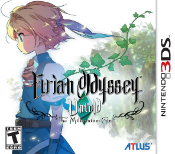This game is great. Played a few dungeons already and I'm hooked. Can't wait to play more tonight!
Etrian Odyssey Untold: The Millennium Girl Review
|
|
See PixlBit's Review Policies

On 09/30/2013 at 12:00 PM by Travis Hawks Get hooked on this cult fave where it all began. |

For you, you, you, and yes, you.
It seems like the Etrian Odyssey series has steadily won over more and more fans since its first entry in 2007. Along the way, Atlus has added in niceties to take the edge off of a series that demands a lot of its players, and revisiting the original entry with these tweaks turns out to be a great move. Even though it seems a bit odd to remake a game that’s only six years old, Etrian Odyssey Untold: The Millenium Girl is the perfect way to please existing fans and those just joining the dungeon-diving party.
Easily the biggest and most touted change from the original is the addition of a story mode, which is a pretty big deal since the core of the series has always been party creation, skill tree management, and other anal retentive activities that appeal to those of us that can have serious bouts of monomania. Luckily, playing through the story mode doesn’t detract from all of the obsessive-compulsive qualities fans love about Etrian Odyssey. If anything, the only detractor in that regard is that you have to use a pre-made party and have to read through some longer than typical dialogue sequences – both things that are easy to endure and are actually enjoyable at times.
The story itself isn’t going to wow you with its originality, since it’s got everything you’d expect - the amnesiac girl from an ancient civilization, the city leader with a mysterious air, the bumbling hungry guy, so on and so forth. Luckily, the actual dialogue that fleshes out the story is well-written and normally doesn’t go on needlessly to keep you from getting back into the dungeon. There are a lot of dialogue options to pick from as the story progresses too, although you can tell that they found a way to write every one of them back to the same conclusion, so in the end they don’t really matter. There’s no morality bar or branching storylines here, it’s just classic RPG stuff to provide reasons for all of this adventuring.
It was a little hard for me to swallow letting the game proscribe a party for me since toying around with that aspect is something I’ve come to love about the series. More of an adjustment is the skill tree that felt somewhat rudimentary after just playing Etrian Odyssey IV. There are less means to leverage one party member’s skills off of another and there seem to be less interesting skills in general, but this is a remake after all, and they had to keep the foundations intact. The deeper I got in the game, though, the more I found hidden gems in the initially unattractive branches of the skill trees and soon forgot my disappointment.
A few new features have been added to the basics, like Grimoire Stones and the ability to buy tinctures and other assists from your guild keepers. The guild keeper bonuses are simple, allowing for benefits like increases in party HP or regeneration of TP at the end of each turn in-battle. Once you start using these options, stopping by your home base before every outing becomes necessary or you’ll expect those perks and then get screwed when you realize you left town without re-upping them. The Grimoire Stone system on the other hand is a bit opaque and really feels like it was added simply for the sake of adding something new.
You’re awarded Grimoire Stones during battle under certain conditions, and they have different abilities attached to them. You can synthesize different ones together and customize them into a combo you find more useful. This synthesis process is explained, but not very well, or at least its benefits are not made apparent. After reading the instructions a couple of times and doing some experiments, I decided to primarily use whatever was randomly given to me and not mess with it much. Once I had a set that helped me out in most battles, I left them alone – except to throw some away once I had collected more than the allowed 99.
Outside of all of the new content, the base game is as pleasingly addictive as I’ve come to expect from the series. Completing quests for the townsfolk, delving one level deeper into the dungeon, creating an intricate map of a floor, and pushing my party through one more risky battle flips every one of my switches. I was fairly obsessed, playing for a solid month during every free moment I could muster – and I’m still not done.
Even if the game were comprised of the original dungeon maps alone, there’s plenty here to be impressed by. You would think that after a few floors were mapped out and a few dozen enemy types were defeated, you’d have it all down and plow ahead without using your noggin one bit, but that isn’t what happens at all. The enemies continue to be gifted with a huge variety of compounding abilities that you have to puzzle through depending on their strengths, combinations, and placements in every single battle. Reaching a new dungeon floor doesn’t always lead to a new environment or color palette, but different requirements to traverse the floor continuously crop up. Sometimes you have to puzzle through lengthy series of one-way passages and other times you have to go up and down staircases to find the particular door you’re looking for. You’re always on guard and always engaged with what’s happening on both the map and action screen.
Add to the huge classic dungeon an entirely new dungeon with its own tricky maneuvering and there’s plenty to enjoy here for veterans of the first release and people – like me – who missed out initially. You can even take advantage of a few new ways to speed things up a bit, like a “run” button and floor jumps that let you teleport to stairs on completed floors. Both of these, and other friendly measures like markers for secret passages, might make OG players think this version is for babies and not the true experience. Even with all of these niceties, though, there are plenty of opportunities to get trounced, lose tons of progress, and squeak out of a battle with a lone survivor and barely make it back to town. It’s just as hardcore as it should be, even if the toughest spots can be traveled to a little faster.
Like I said in my Etrian Odyssey IV review, this series isn’t going to appeal to everyone, but between these last two entries, I’m starting to feel like there are fewer and fewer people out there that can’t get something out of these games. Atlus has honed their Wizardry-based formula, added the right convenience measures, kept the right amount of potential for soul-destroying defeats, and now added an acceptable narrative for those that need that too. All of my minor beefs with Etrian Odyssey Untold: The Millennium Girl are easily overlooked (or avoided completely) with no detriment to the experience, and what I found unnecessary might really hook someone else. It’s time to find out if the series will grab you by starting at the beginning with this remake and drawing that first dungeon map – you won’t regret it.













Comments